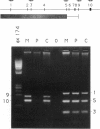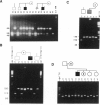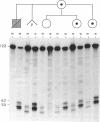Abstract
Since the cloning of the cDNA for X-linked ornithine transcarbamylase (OTC) in 1984, diagnostic accuracy of OTC deficiency for prenatal and carrier detection has been greatly improved by the use of linkage analysis. However, the use of RFLP-based diagnosis is limited in this and in other new mutation diseases. Here we report both the use of direct mutation detection by new PCR-based techniques and our experience with linkage-based diagnosis in 18 families. We have previously reported the use of chemical mismatch cleavage to detect mutations first in amplified mRNA and then in genomic DNA of patients. This technique has now been utilized for prenatal diagnosis. Primers for specific amplification of OTC exons 1, 3, 5, 9, and 10 have been developed and been employed to map deletions of the OTC gene in two families. These primers also have been used to detect alterations in the TaqI sites found in exons 1, 3, 5, and 9. Four novel mutations of the OTC gene leading to abolition of a TaqI site in the OTC cDNA were discovered. One of these mutations is in exon 1; two lie in exon 3; and one is in exon 9. In addition, we have used the PCR products as probes to identify the exon-specific bands seen on Southern blots and to map the polymorphic BamHI and MspI sites, which are commonly used for linkage analysis. This information will facilitate the interpretation of altered band patterns seen in deletion cases and in cases of point mutations affecting restriction sites. Utilization of the appropriate combination of these molecular techniques permitted accurate diagnostic evaluations in 17 of 18 families.
Full text
PDF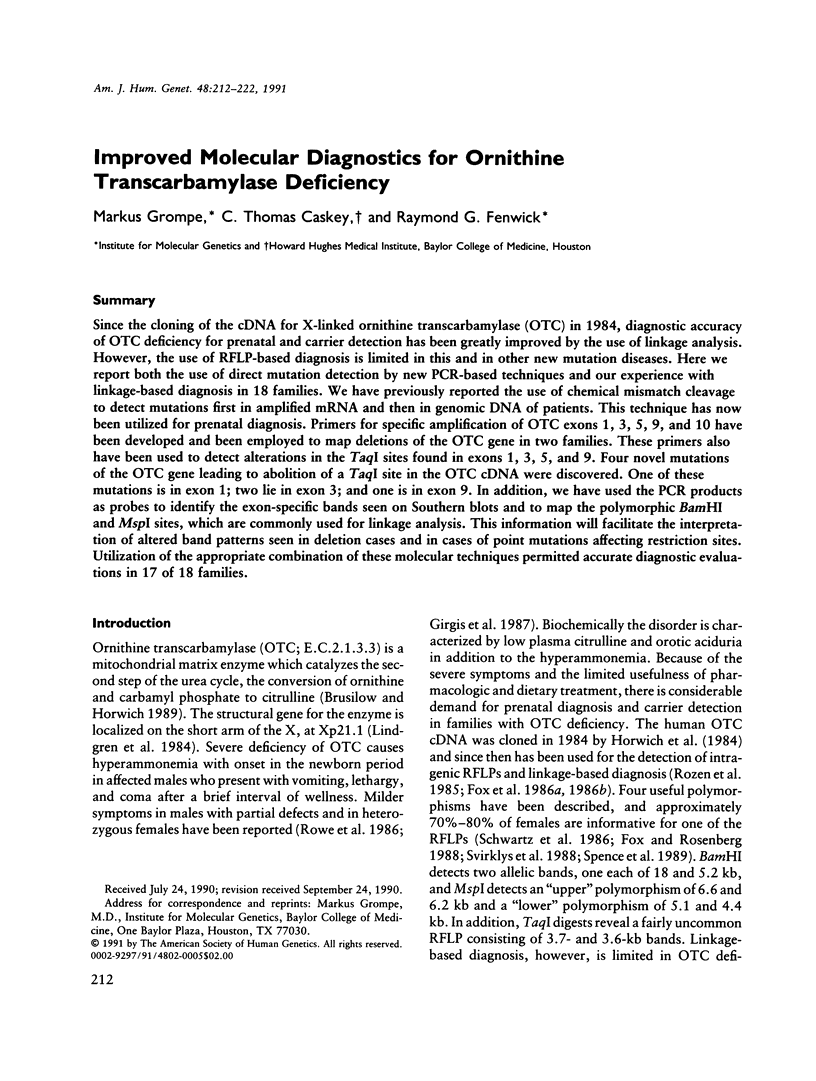
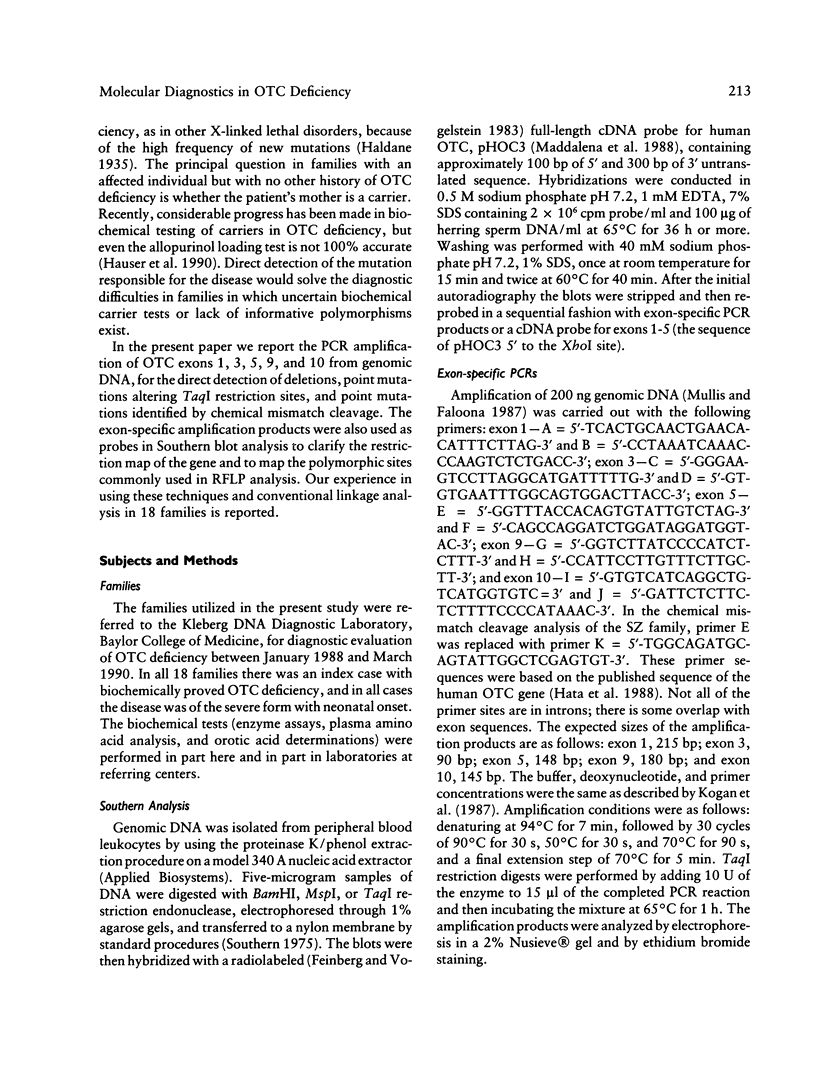
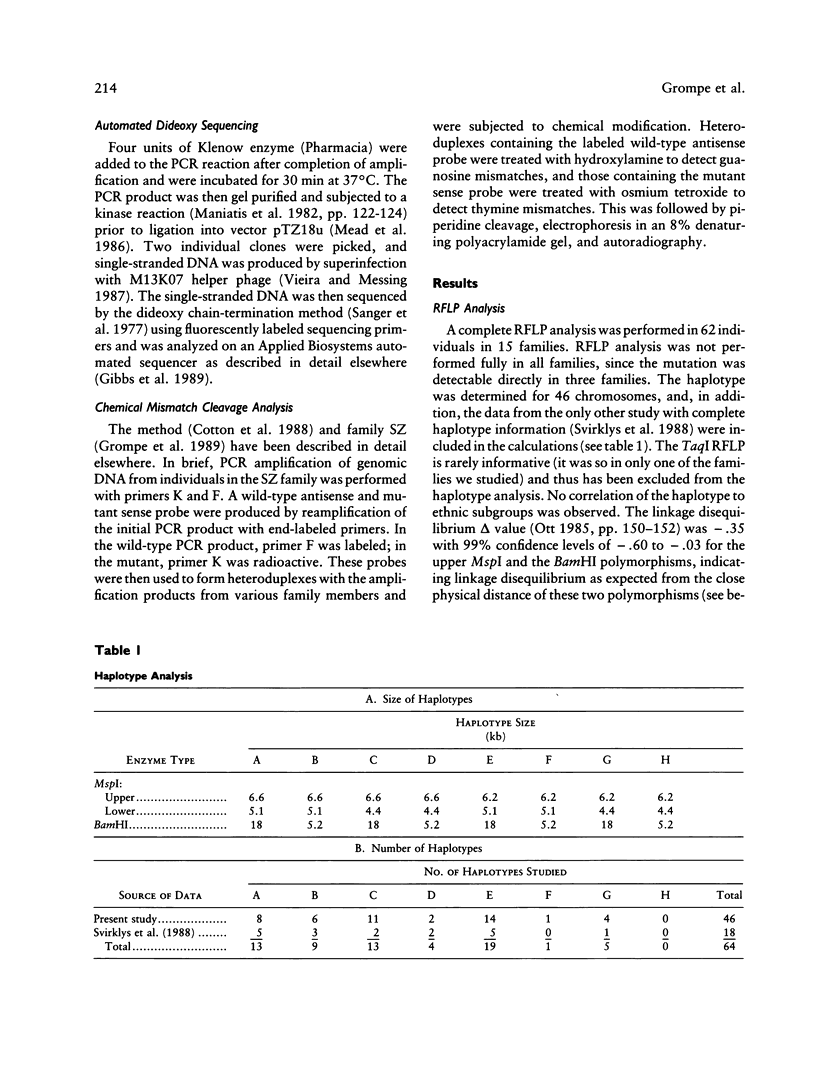
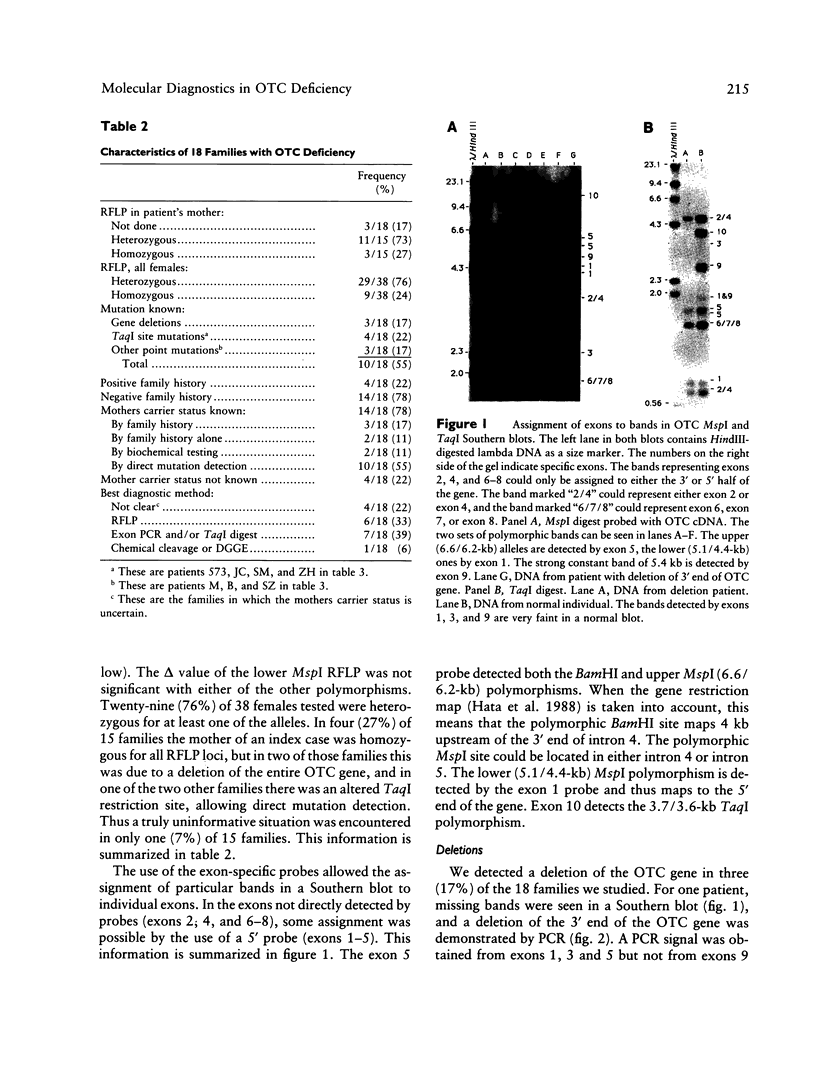
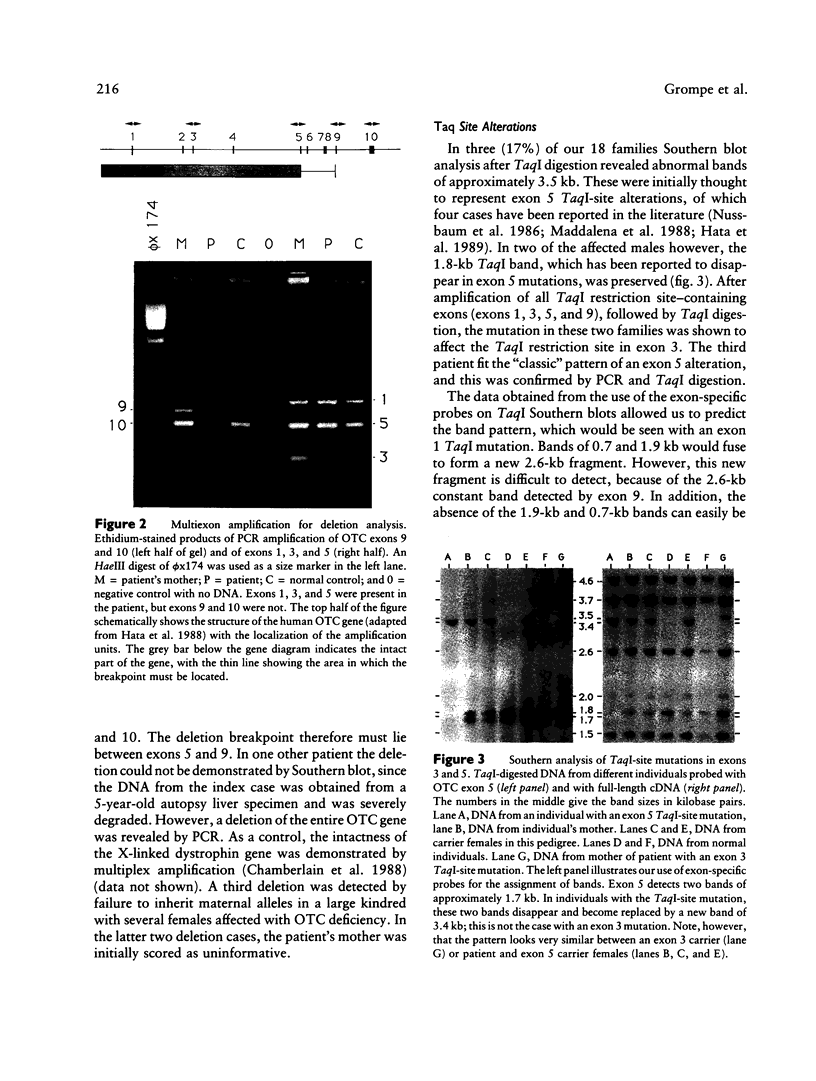
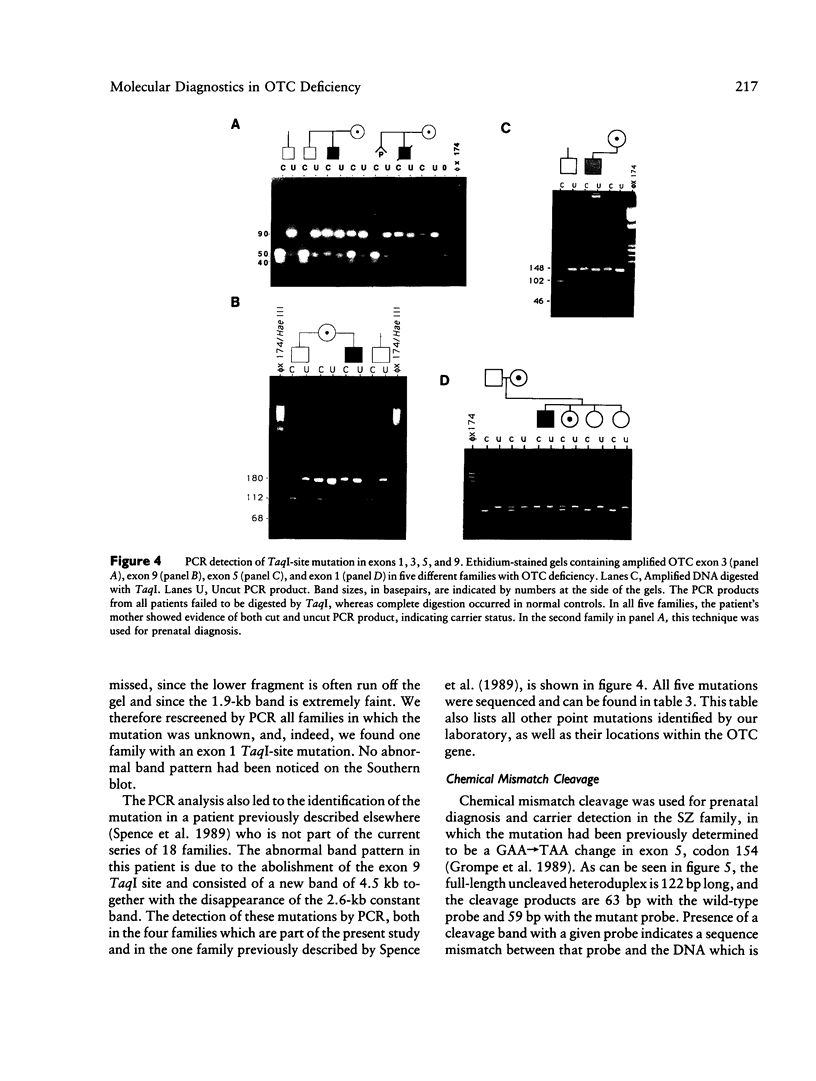
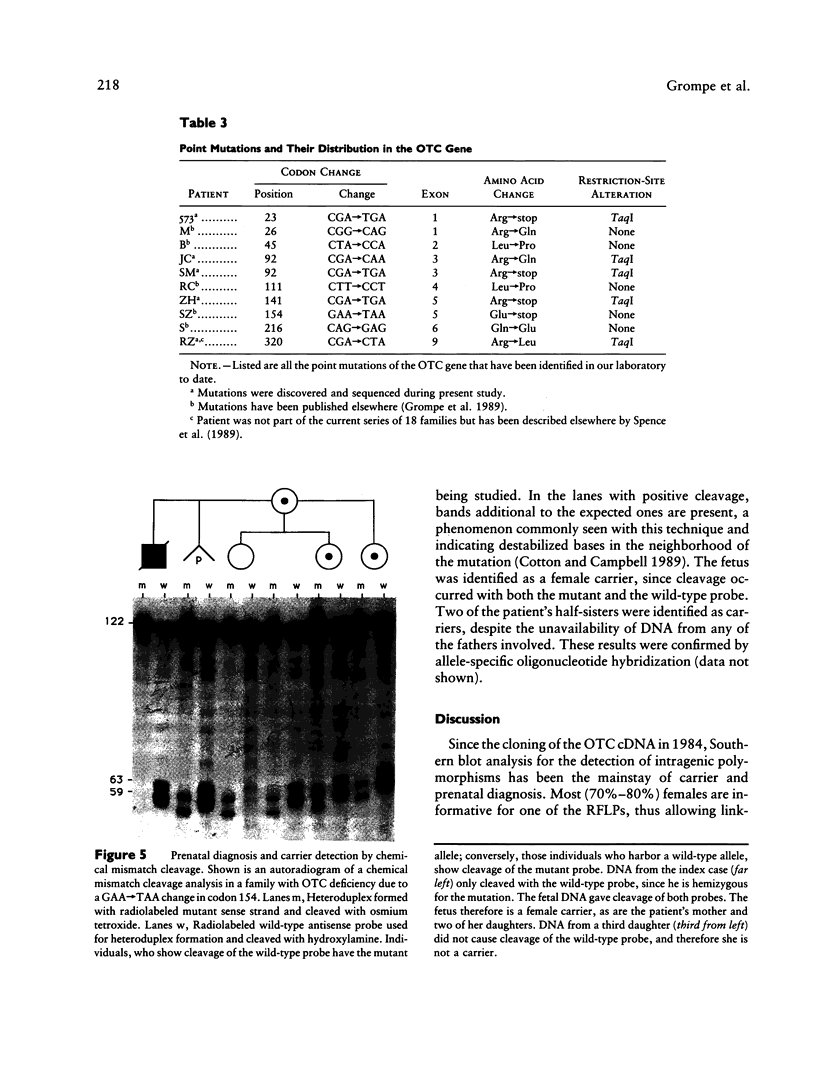
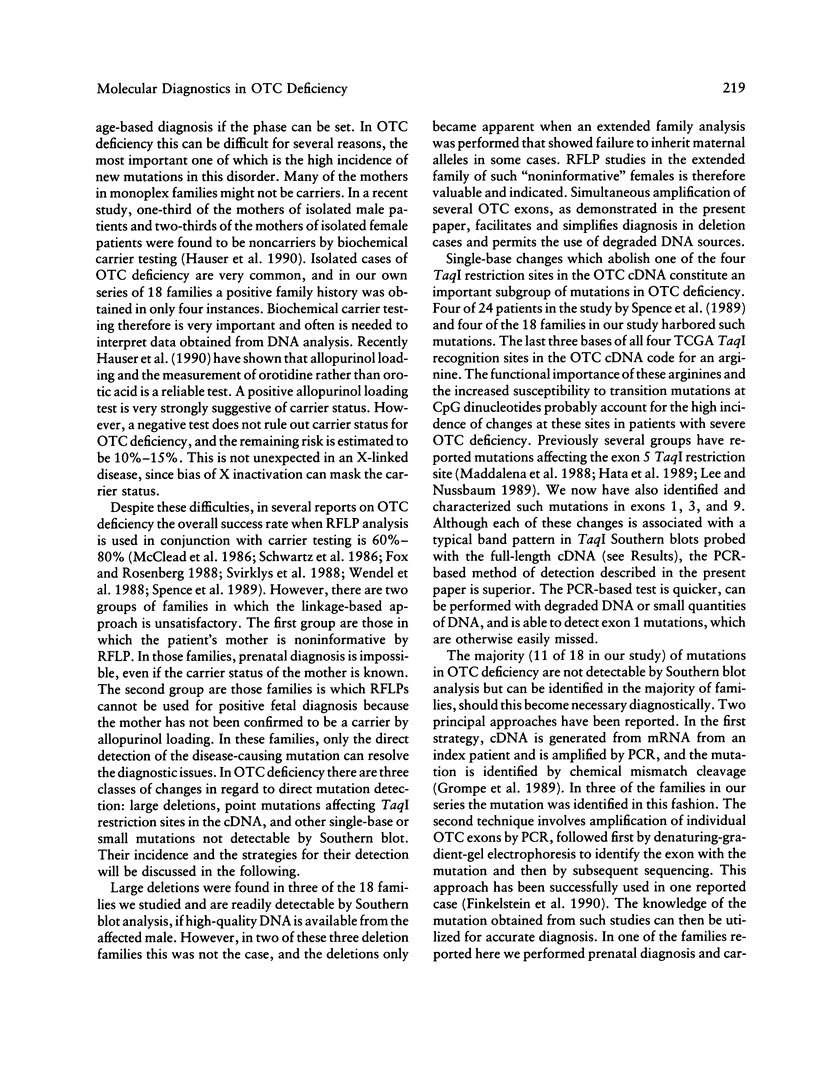
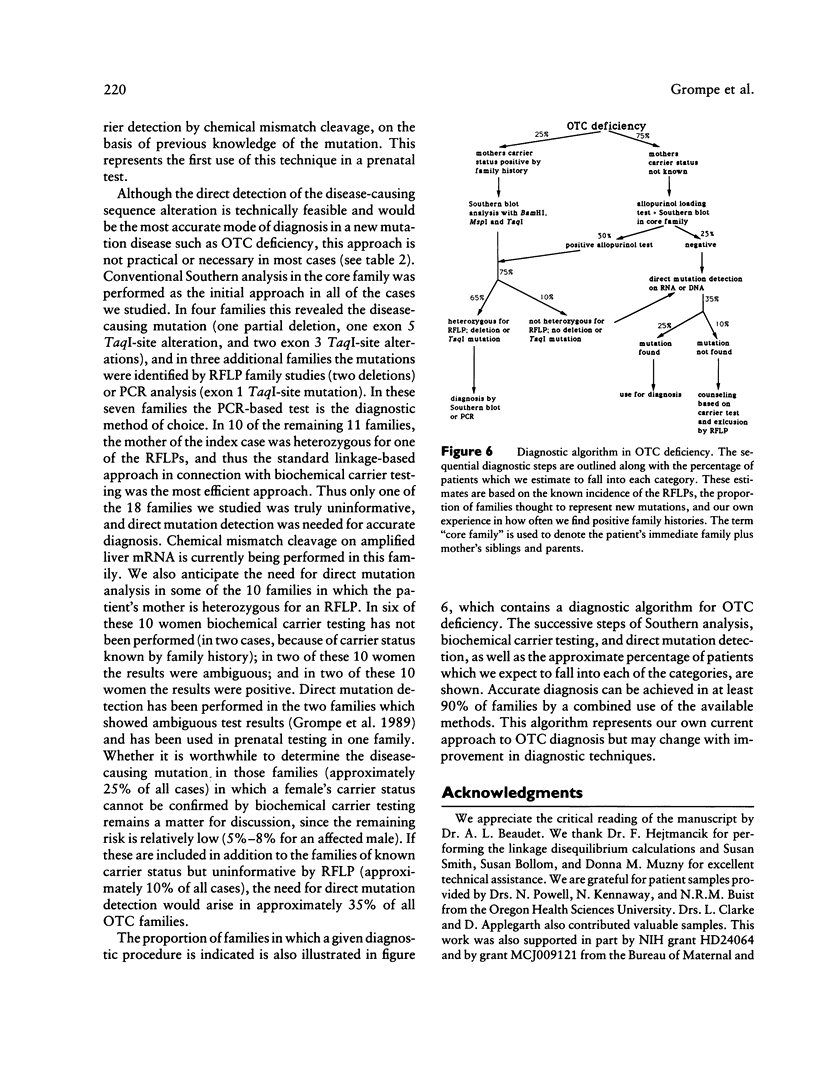
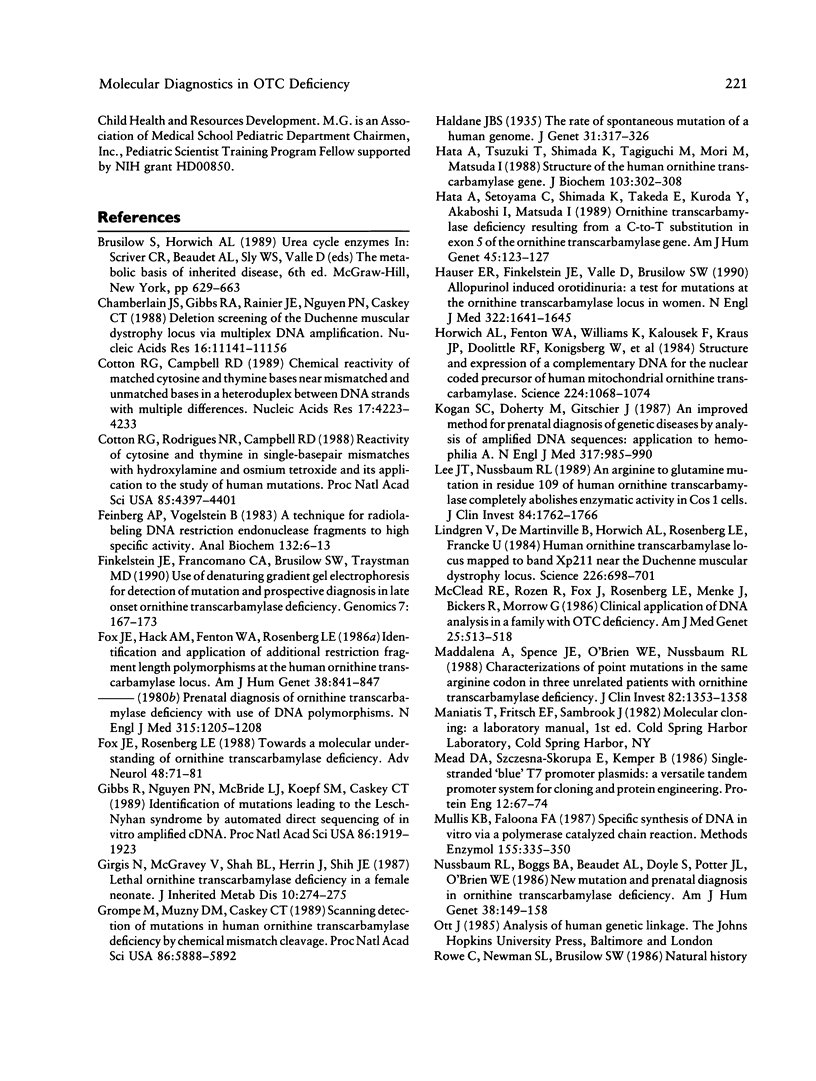
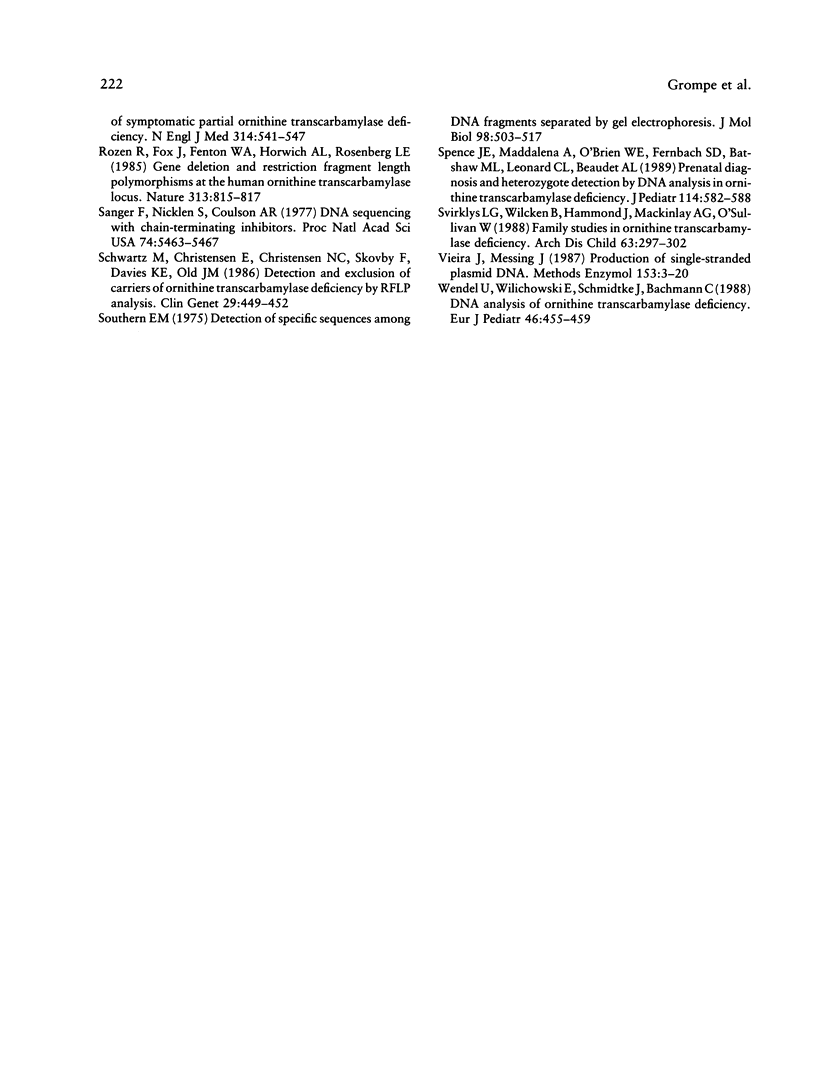
Images in this article
Selected References
These references are in PubMed. This may not be the complete list of references from this article.
- Chamberlain J. S., Gibbs R. A., Ranier J. E., Nguyen P. N., Caskey C. T. Deletion screening of the Duchenne muscular dystrophy locus via multiplex DNA amplification. Nucleic Acids Res. 1988 Dec 9;16(23):11141–11156. doi: 10.1093/nar/16.23.11141. [DOI] [PMC free article] [PubMed] [Google Scholar]
- Cotton R. G., Campbell R. D. Chemical reactivity of matched cytosine and thymine bases near mismatched and unmatched bases in a heteroduplex between DNA strands with multiple differences. Nucleic Acids Res. 1989 Jun 12;17(11):4223–4233. doi: 10.1093/nar/17.11.4223. [DOI] [PMC free article] [PubMed] [Google Scholar]
- Cotton R. G., Rodrigues N. R., Campbell R. D. Reactivity of cytosine and thymine in single-base-pair mismatches with hydroxylamine and osmium tetroxide and its application to the study of mutations. Proc Natl Acad Sci U S A. 1988 Jun;85(12):4397–4401. doi: 10.1073/pnas.85.12.4397. [DOI] [PMC free article] [PubMed] [Google Scholar]
- Feinberg A. P., Vogelstein B. A technique for radiolabeling DNA restriction endonuclease fragments to high specific activity. Anal Biochem. 1983 Jul 1;132(1):6–13. doi: 10.1016/0003-2697(83)90418-9. [DOI] [PubMed] [Google Scholar]
- Finkelstein J. E., Francomano C. A., Brusilow S. W., Traystman M. D. Use of denaturing gradient gel electrophoresis for detection of mutation and prospective diagnosis in late onset ornithine transcarbamylase deficiency. Genomics. 1990 Jun;7(2):167–172. doi: 10.1016/0888-7543(90)90537-5. [DOI] [PubMed] [Google Scholar]
- Fox J. E., Hack A. M., Fenton W. A., Rosenberg L. E. Identification and application of additional restriction fragment length polymorphisms at the human ornithine transcarbamylase locus. Am J Hum Genet. 1986 Jun;38(6):841–847. [PMC free article] [PubMed] [Google Scholar]
- Fox J. E., Rosenberg L. E. Toward a molecular understanding of ornithine transcarbamylase deficiency. Adv Neurol. 1988;48:71–81. [PubMed] [Google Scholar]
- Gibbs R. A., Nguyen P. N., McBride L. J., Koepf S. M., Caskey C. T. Identification of mutations leading to the Lesch-Nyhan syndrome by automated direct DNA sequencing of in vitro amplified cDNA. Proc Natl Acad Sci U S A. 1989 Mar;86(6):1919–1923. doi: 10.1073/pnas.86.6.1919. [DOI] [PMC free article] [PubMed] [Google Scholar]
- Girgis N., McGravey V., Shah B. L., Herrin J., Shih V. E. Lethal ornithine transcarbamylase deficiency in a female neonate. J Inherit Metab Dis. 1987;10(3):274–275. doi: 10.1007/BF01800079. [DOI] [PubMed] [Google Scholar]
- Grompe M., Muzny D. M., Caskey C. T. Scanning detection of mutations in human ornithine transcarbamoylase by chemical mismatch cleavage. Proc Natl Acad Sci U S A. 1989 Aug;86(15):5888–5892. doi: 10.1073/pnas.86.15.5888. [DOI] [PMC free article] [PubMed] [Google Scholar]
- Hata A., Setoyama C., Shimada K., Takeda E., Kuroda Y., Akaboshi I., Matsuda I. Ornithine transcarbamylase deficiency resulting from a C-to-T substitution in exon 5 of the ornithine transcarbamylase gene. Am J Hum Genet. 1989 Jul;45(1):123–127. [PMC free article] [PubMed] [Google Scholar]
- Hata A., Tsuzuki T., Shimada K., Takiguchi M., Mori M., Matsuda I. Structure of the human ornithine transcarbamylase gene. J Biochem. 1988 Feb;103(2):302–308. doi: 10.1093/oxfordjournals.jbchem.a122265. [DOI] [PubMed] [Google Scholar]
- Hauser E. R., Finkelstein J. E., Valle D., Brusilow S. W. Allopurinol-induced orotidinuria. A test for mutations at the ornithine carbamoyltransferase locus in women. N Engl J Med. 1990 Jun 7;322(23):1641–1645. doi: 10.1056/NEJM199006073222305. [DOI] [PubMed] [Google Scholar]
- Horwich A. L., Fenton W. A., Williams K. R., Kalousek F., Kraus J. P., Doolittle R. F., Konigsberg W., Rosenberg L. E. Structure and expression of a complementary DNA for the nuclear coded precursor of human mitochondrial ornithine transcarbamylase. Science. 1984 Jun 8;224(4653):1068–1074. doi: 10.1126/science.6372096. [DOI] [PubMed] [Google Scholar]
- Kogan S. C., Doherty M., Gitschier J. An improved method for prenatal diagnosis of genetic diseases by analysis of amplified DNA sequences. Application to hemophilia A. N Engl J Med. 1987 Oct 15;317(16):985–990. doi: 10.1056/NEJM198710153171603. [DOI] [PubMed] [Google Scholar]
- Lee J. T., Nussbaum R. L. An arginine to glutamine mutation in residue 109 of human ornithine transcarbamylase completely abolishes enzymatic activity in Cos1 cells. J Clin Invest. 1989 Dec;84(6):1762–1766. doi: 10.1172/JCI114360. [DOI] [PMC free article] [PubMed] [Google Scholar]
- Lindgren V., de Martinville B., Horwich A. L., Rosenberg L. E., Francke U. Human ornithine transcarbamylase locus mapped to band Xp21.1 near the Duchenne muscular dystrophy locus. Science. 1984 Nov 9;226(4675):698–700. doi: 10.1126/science.6494904. [DOI] [PubMed] [Google Scholar]
- Maddalena A., Spence J. E., O'Brien W. E., Nussbaum R. L. Characterization of point mutations in the same arginine codon in three unrelated patients with ornithine transcarbamylase deficiency. J Clin Invest. 1988 Oct;82(4):1353–1358. doi: 10.1172/JCI113738. [DOI] [PMC free article] [PubMed] [Google Scholar]
- McClead R. E., Jr, Rozen R., Fox J., Rosenberg L., Menke J., Bickers R., Morrow G., 3rd Clinical application of DNA analysis in a family with OTC deficiency. Am J Med Genet. 1986 Nov;25(3):513–518. doi: 10.1002/ajmg.1320250313. [DOI] [PubMed] [Google Scholar]
- Mead D. A., Szczesna-Skorupa E., Kemper B. Single-stranded DNA 'blue' T7 promoter plasmids: a versatile tandem promoter system for cloning and protein engineering. Protein Eng. 1986 Oct-Nov;1(1):67–74. doi: 10.1093/protein/1.1.67. [DOI] [PubMed] [Google Scholar]
- Mullis K. B., Faloona F. A. Specific synthesis of DNA in vitro via a polymerase-catalyzed chain reaction. Methods Enzymol. 1987;155:335–350. doi: 10.1016/0076-6879(87)55023-6. [DOI] [PubMed] [Google Scholar]
- Nussbaum R. L., Boggs B. A., Beaudet A. L., Doyle S., Potter J. L., O'Brien W. E. New mutation and prenatal diagnosis in ornithine transcarbamylase deficiency. Am J Hum Genet. 1986 Feb;38(2):149–158. [PMC free article] [PubMed] [Google Scholar]
- Rowe P. C., Newman S. L., Brusilow S. W. Natural history of symptomatic partial ornithine transcarbamylase deficiency. N Engl J Med. 1986 Feb 27;314(9):541–547. doi: 10.1056/NEJM198602273140903. [DOI] [PubMed] [Google Scholar]
- Rozen R., Fox J., Fenton W. A., Horwich A. L., Rosenberg L. E. Gene deletion and restriction fragment length polymorphisms at the human ornithine transcarbamylase locus. 1985 Feb 28-Mar 6Nature. 313(6005):815–817. doi: 10.1038/313815a0. [DOI] [PubMed] [Google Scholar]
- Sanger F., Nicklen S., Coulson A. R. DNA sequencing with chain-terminating inhibitors. Proc Natl Acad Sci U S A. 1977 Dec;74(12):5463–5467. doi: 10.1073/pnas.74.12.5463. [DOI] [PMC free article] [PubMed] [Google Scholar]
- Schwartz M., Christensen E., Christensen N. C., Skovby F., Davies K. E., Old J. M. Detection and exclusion of carriers of ornithine transcarbamylase deficiency by RFLP analysis. Clin Genet. 1986 May;29(5):449–452. doi: 10.1111/j.1399-0004.1986.tb00520.x. [DOI] [PubMed] [Google Scholar]
- Southern E. M. Detection of specific sequences among DNA fragments separated by gel electrophoresis. J Mol Biol. 1975 Nov 5;98(3):503–517. doi: 10.1016/s0022-2836(75)80083-0. [DOI] [PubMed] [Google Scholar]
- Spence J. E., Maddalena A., O'Brien W. E., Fernbach S. D., Batshaw M. L., Leonard C. O., Beaudet A. L. Prenatal diagnosis and heterozygote detection by DNA analysis in ornithine transcarbamylase deficiency. J Pediatr. 1989 Apr;114(4 Pt 1):582–588. doi: 10.1016/s0022-3476(89)80697-3. [DOI] [PubMed] [Google Scholar]
- Svirklys L. G., Wilcken B., Hammond J., Mackinlay A. G., O'Sullivan W. J. Family studies in ornithine transcarbamylase deficiency. Arch Dis Child. 1988 Mar;63(3):297–302. doi: 10.1136/adc.63.3.297. [DOI] [PMC free article] [PubMed] [Google Scholar]
- Vieira J., Messing J. Production of single-stranded plasmid DNA. Methods Enzymol. 1987;153:3–11. doi: 10.1016/0076-6879(87)53044-0. [DOI] [PubMed] [Google Scholar]




